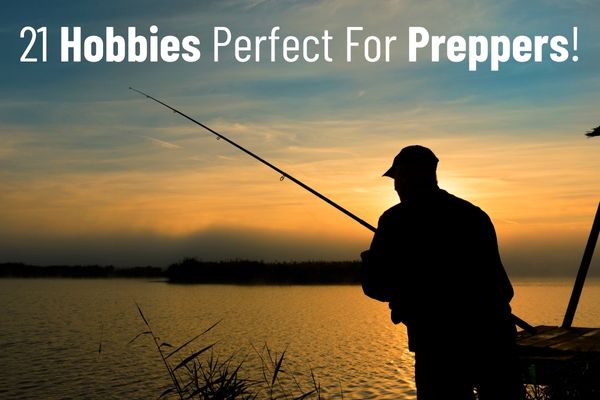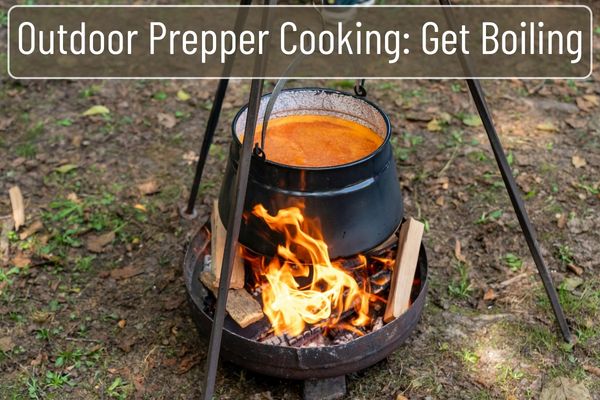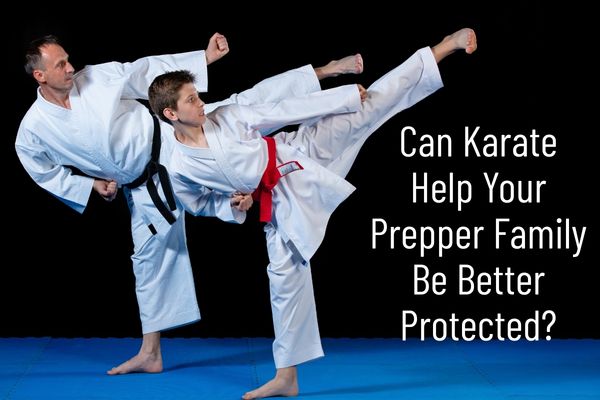Everyday Hobbies May Save Your Life
While it’s great to create a prepper plan that includes buying and storing essential prepper supplies, it’s equally important to gain knowledge and skills to survive in a disaster scenario.
Well, what if I told you that you’ve already made steps to gaining valuable, life-saving skills without reading one prepper book, prepper blog, or downloading a prepper app? Let me explain.
You most likely perform everyday hobbies for enjoyment that in turn could offer you critical skills necessary to face a bugout or bug-in scenario. Some hobby skills can be put into action should you be placed in an emergency situation.
Here are 21 great hobbies that could help you develop important skills and strengths that preppers value.
<1> Hiking
Hiking is a hobby that many families enjoy together, combining nature, fresh air, exercise, and goal setting. Just like a beginner hiker will not set out to climb the steepest hill, a prepper cannot expect to bugout on foot for long distances without a bit of practice and training. So, being an avid hiker can be beneficial should an unexpected bugout or evacuation scenario force you to set out and find a safe location on foot.
Learning to maneuver uneven terrains will help you build stamina and prepare your muscles for longer hikes. Many hikers appreciate the mental clarity that comes with surrounding yourself in nature. Hiking is a great way to test your perseverance and physical ability and prepare you for when a leisurely hike turns into a prepper’s run for survival.
<2> Backpacking
While hiking typically only requires you to carry what you need for a daytime hike like hydration, a towel, and some snacks, there’s no better way to test out your ability to bugout than to go backpacking while carrying your fully stocked prepper backpack.
When backpacking, you’re carrying more. And this helps prepare your body for the rigors of carrying a bugout bag and traveling during a real-life disaster scenario.
Every time you backpack you can gain invaluable prepper confidence … like practicing navigational skills in the woods … building a shelter, or foraging for valuable plants.
<3> Camping
Camping is a wonderful hobby for families to spend quality time in nature. But at the same time, it offers you a way to practice survival skills. Camping gives you the opportunity to assemble a tent for shelter, build a fire for cooking or for warmth, and learn to live off the grid, even if it’s just for the weekend.
<4> Hunting and Trapping
Learning how to hunt for food could be critical for survival in a serious disaster scenario. That’s why hunting as a hobby provides a to get in touch with nature, while you better learn how to provide for yourself should you need alternative food sources.
Hunting for deer, ducks, or other animals requires a certain level of patience, practice, instinct, and the ability to locate animals, stalk, track their movements, camouflage yourself, and show respect for nature’s resources. When it comes to hunting as a hobby, you’ll first need the skills to use firearms, snares, bowed weapons, and traps. Remember when hunting and trapping, you’ll need to follow all local rules and regulations.
<5> Fishing
Fishing like hunting is not only a great hobby but also an ideal way to provide food for your family during a bugout situation. Learning to fish is not something you want to learn when you’re desperate for food. Take up fishing as a hobby now so you’ll be a pro should you be faced with a disaster scenario. Effective fishing is more than just throwing a line into the water. Gain the necessary skills now and discover how much fun it is to go fishing.
In addition to learning how to catch fish, you should also learn to clean, cut, and prepare the fish to cook, especially on a camping type of stove. That way, you’ll be ready to cook the fish during a power loss or bugout situation. Keep in mind that fish is an excellent source of protein and essential Omega-3 fatty acids.
<6> Gardening
Even if you’re bugging out at home, your prepper food supplies won’t last forever. You’ll want to have many backup food options to provide for yourself and your family. Learning to grow your own vegetables, fruits, and herbs as a hobby are skills that can enhance your survival when food is scarce.
Tending to a small garden in your backyard, will improve your gardening skills. You’ll gain confidence and gradually add more crops to grow. A large, flourishing garden will make you more self-sufficient.
Another reason to begin your gardening hobby right away is that planting a garden will nurture the soil. Every harvest will yield more and more vegetables, herbs, and fruits. If you lack a yard to create a garden, plant in containers.
<7> Food Preserving
Many families make an annual event out of canning fresh tomatoes from the garden as well as canning fruit preserves. However, that fun hobby can be a huge asset to preppers. You see, preserving food provides a longer shelf life, something every prepper relies on, so the stored food supply remains stocked and ready for when needed.
Preppers can learn to dehydrate foods with a dehydrator. Preppers typically add jerky and other dehydrated snacks to their prepper food supply. Freeze-drying food is also another hobby you can learn to preserve foods.
<8> Foraging in the Wild
Foraging for food is not only a great skill but it can be a fun hobby for the family. Imagine taking a hike in the woods and learning to identify which wild foods are edible and which could in fact be poisonous. Foraging is so much more than just picking strawberries, blueberries, and blackberries. The more knowledgeable you get from your foraging hobby, the more advantageous that hobby will be should you need to rely on alternate food sources.
<9> Physical Fitness/Team Sports
Prepping for disaster scenarios sometimes can be described as “survival of the fittest.” That’s because a bugout or evacuation scenario may cause major exertion on your body.
Practicing physical fitness now can make a big difference on how you perform prepper responsibilities should you be called upon to trek to safety, build shelter, carry a bugout bag, and other physically demanding actions. You want to be sure that you have the strength to handle any physical challenge that comes your way.
<10> Martial Arts
Martial arts help teach people self-defense, discipline, and mental focus, while it improves fitness and boosts confidence. Learning a martial art would provide you with the ability to protect your family during a real emergency. Whether you participate in Karate, Kung Fu, Brazilian Jui jitsu, boxing, or another discipline … the benefits are invaluable.
<11> Raising Chickens and other Backyard Livestock
Raising chickens or other livestock can provide a continuous supply of fresh eggs, meat, milk, and other dairy products to your food supply. It’s advised that you start with raising chickens. As you gain skills, expand to ducks, goats, rabbits, and other animals. Of course, you must research local regulations regarding whether raising chickens and other animals is even allowed in your county or local area.
<12> Beekeeping
Beekeeping as a hobby has grown quite popular and the honey and beeswax are a valuable addition to any prepper supply. A fresh supply of honey is ideal for eating and for medicinal uses. Beeswax is essential for food preservation and for making candles, deodorant, and a base for medicinal ointments like healing salves.
<13> Astronomical Navigation and Meteorology
Learning astronomical navigation and meteorology as hobbies are invaluable skills should you bugout with a lack of cell service. Astronomy skills can help you navigate for survival by recognizing placement of the stars, planets, and constellations in the sky. Meteorology skills can help you understand good and bad cloud formations to protect you from unexpected weather changes.
<14> Weaponry and Marksmanship
Practicing handling and using firearms as a hobby or for self-defense requires gaining local permits and practicing at local shooting ranges. It also requires learning basic firearm safety. And while some may call it a hobby, weaponry and marksmanship can be highly beneficial as a survival skill. Firearms can be used for self-defense and hunting. Learning the fundamentals of weaponry and marksmanship now can help improve your prepper confidence.
<15> Archery and Axe Throwing
When it comes to survival, the hobbies of archery and axe throwing build self-defense and hunting skills. Bow hunting relies on precise aim, eye-hand coordination, and focus. These hobbies are especially important if you do not have a firearm or run out of bullets. Learning how to shoot a bow and arrow, use a slingshot, or throw an axe or knife, can be fun hobbies, while providing important survival skills.
<16> Geocaching/Orienteering
While geocaching can be a fun hobby with family, it also provides navigating skills and situational awareness in the wild. Geocaching involves the hiding of items, instructions on how to locate the items, and takes a lot of creative thought and perseverance.
Orienteering is another way to improve your navigational skills, but this hobby involves a compass and a map typically while you maneuver a timed trek on a course in the woods or even a hiking trail. Both geocaching and orienteering provide great practice for bugging out.
<17> Ham Radio Operation
Lack of communication is an issue in a disaster scenario. That’s why many preppers take the necessary steps to learn how to operate a Ham radio as part of their emergency prepper plan. A Ham radio provides dependable communication even during power loss or no cell service. However, a Ham operator must obtain a license and a call sign from the FCC before operating the radio.
<18> Carpentry: Building and Repair
Carpentry makes for a great hobby or career. And it’s a great survival skill, too. Carpentry skills can help a prepper create a well-structured temporary shelter in addition to other prepper projects. Even a hobby of carving wood into a variety of shapes can be a huge asset for survival – to be able to craft tools or other essentials in any situation.
<19> Sewing
While dropping off a suit at my local tailor’s shop to repair a torn pocket and replace some missing buttons, I teased the tailor asking if there is anything he can’t mend. He teased me back about my lack of skills to sew a button back on. That got me thinking about how valuable a sewing hobby could be in prepper situations. Adding basic sewing gear like thread, needles, and scissors to a bugout bag could help should you need to repair tent materials, tarps, or even clothing. And as uncomfortable as this sounds, learning to make a basic sewing stitch could also help should you need to apply first aid by “sewing a stitch” on wounded skin.
While a prepper can take advantage of a sewing hobby to sew blankets to add to a prepper supply to make comfortable bugout bedding or provide warmth, the same holds true for quilting, knitting, and crocheting hobbies.
<20> Candle Making
Candle making is a fun hobby that offers more than a pretty candle or pleasant scent. It can also offer functionality. Candles can be an essential prepper supply to provide ample light during a power loss. Remember, a beekeeping hobby can help provide the beeswax to make the candles.
<21 Soap Making
Making soap can be a fun hobby. But in an emergency situation, personal hygiene is still critical to your overall health. This is especially true if you have an open wound. Gaining soap making skills now can make a huge difference later when you have no access to store-bought soap. Soap can be made from basic ingredients like oils, lye, and fats, and then you can alter the ingredients and scents based on preference. Making soap in bulk quantities for your prepper supply ensures that you can maintain hygiene and help lessen the risk of infections.
Conclusion: Hobbies Produce Life-Saving Skills
Whether you are currently juggling hobbies or looking to add a hobby or two, the skills you gain from hobbies could help you thrive and survive during an emergency. So, while you’re creating a prepper plan or adding essential gear and supplies to your prepper storage, consider the potential of gaining skills through hobbies.
In a world of uncertainty, one thing is clear, you can never be 100% ready for any unexpected disaster. But skills gained from hobbies can elevate your level of confidence by equipping you with valuable survival skills.




